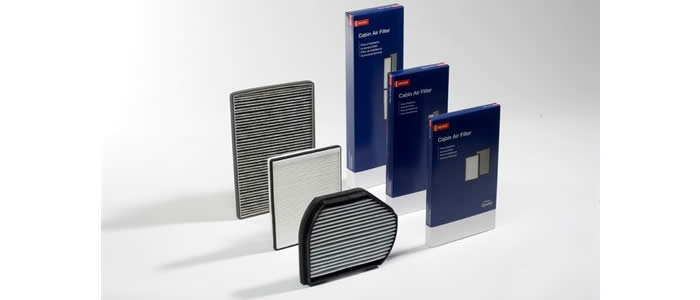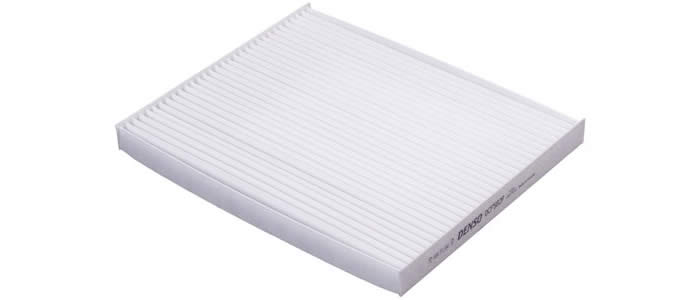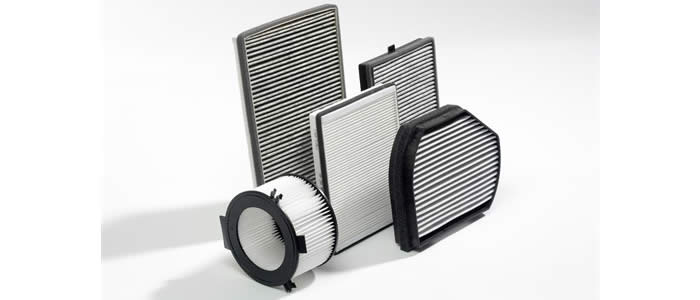
A breath of fresh air – opportunities presented by cabin air filter replacements
As countries across Europe ease lockdown restrictions just in time for the summer driving season, vehicle air conditioning systems are likely to be switched on following months spent dormant. With air pollution and hay fever prevalent at this time of year, the last thing motorists want is air cabin filter failure. Offering a simple but effective cabin air filter replacement at this time of year not only represents a great profit opportunity for repairers, but ensures improved air quality inside the vehicle, protecting customers against potential health problems.
The role of the cabin air filter
Most vehicles manufactured after 2000 have a cabin air filter, designed to filter the air that comes through the vehicle’s heating ventilation and air conditioning (HVAC) systems. It prevents pollutants such as dust, pollen, smog and mold spores from entering the passenger cabin, in addition to catching unwanted debris and pollutants from the road environment.
Since most cabin air filters are situated either under the bonnet where air enters the climate control system or just behind the glove box, they are relatively easy to access and straightforward to replace. They’re often easy to point out to the customer during a vehicle walk-around, particularly when asked to check the air conditioning system. Doing so gives an ideal opportunity to explain the benefits of cabin air filter replacements and potentially benefit from lucrative upsell opportunities.
Why offer cabin air filter replacements now?

Sales of cabin air filters typically rise during summer months because of an increase in pollen count, which particularly affects drivers with allergies or asthmatic conditions. During this time of year, drivers are unknowingly exposed to airborne pollen, which is sucked in through ventilation systems. This, in addition to other pollutants in the air such as dust, soot and exhaust fumes, can cause a host of minor health issues and in turn, distractions from driving.
The cabin air filter plays a critical role preventing dust, dirt, pollen, bacteria and exhaust gases from entering a vehicle’s air conditioning system. Therefore, when air conditioning systems are turned on, the air inside the vehicle remains clean and fresh so drivers and passengers alike can breathe easy, without succumbing to hay fever symptoms.
However, cabin air filters left idle for a long time can become clogged with dirt and debris, compromising both the efficiency of the filter and the vehicle’s air conditioning system. The air quality in the cabin will be continually reduced, which can worsen the effects of allergies as well as leading to unpleasant odors inside the car.
Cabin air filter maintenance and replacement is equally important in electric vehicles, which have no other form of filter included in the vehicle design.
Health benefits
A major global study from Emissions Analytics[1] in 2018 revealed huge variation in the ability of vehicle air conditioning systems to purify incoming air, exposing those inside to millions of poisonous particles with each breath.
During its research, Emissions Analytics discovered up to 57,000 particles per cubic centimeter in some roadside air samples. As people typically inhale around 55cc of air, that means pedestrians are potentially inhaling 28 million particles per breath.
By helping customers pay attention to the condition of their cabin air filter and offering seasonal replacements, up to 100% of dust, pollen and solid particles as small as 0.01 microns can be prevented from entering the vehicle, improving air quality for drivers and passengers alike.
DENSO recommends that cabin air filters are changed after 10,000 to 15,000 km (depending of vehicle type), once a year, or as specified by the vehicle manufacturer. Upgrading or replacing these components with a high-quality alternative will lead to a significant improvement in cabin air quality. Only regular replacement ensures the continued filtration efficiency and good HVAC performance that guarantees a more hygienic, comfortable driving environment.
90% car parc coverage with DENSO

DENSO offers two types of cabin air filter: standard Particle Filters and Combination Filters, which have an additional, activated charcoal layer located inside the filtration material. Both have been introduced into Denso Aftermarket range to provide highly effective OE-quality parts.
Particle Filters from DENSO offer exceptional protection from dust, soot, pollen and particles.
They are manufactured using a high-quality non-woven fleece material that has up to five individual layers. They also feature a high-capacity dust-holding chamber which keeps pollutants away from the vehicle interior.
The Combination Filter is even more accurate, blocking particles that are 1,000 times smaller than a human hair. They are capable of removing up to 25% more major pollutants from the air than standard Particle Filters which don’t contain the activated carbon media. The components work in three ways:
1) A close meshed, non-woven filter layer blocks particles from entering the cabin. Trapped particles are then deposited into the filter housing.
2) Small particles with permanent or temporary charges are attracted to the filter and held back by electrostatic interaction.
3) A layer of fine fibers is spun into the filter media to prevent pressure drop.
The additional, activated carbon layer on DENSO’s combination filters ensure greater carbon air filter efficiency. Not only do they trap dust and debris, they also absorb fumes and odors, ensuring an even cleaner cabin environment.
With so much pollution in the air, the work a regular cabin air filter gets through is staggering. Over the course of 15,000km at a speed of 60 km/h, a standard cabin air filter refreshes a volume of air equivalent to 300 average-sized houses a year[2]. Given this, it’s easy to see how quickly and easily these components can become blocked and underperform. With 90% coverage of the European and Asian car parcs, DENSO’s particle and combination filter technologies are contributing to cleaner air for motorists.
[2] Given an average mileage of 15,000km, at a speed of 60 km/h, this brings the total operation hours to 250. With an average flow rate of 300 m3/hour this means 75,000 m3. Average air volumes in a family house equal 180-400 m3. Taking 250 as an average, your car must refresh your entire house 300 times in a year.



 English
English  Български
Български  Česky
Česky  Dansk
Dansk  Español
Español  Ελληνικά
Ελληνικά  Finnish
Finnish  Français
Français  Hrvatski
Hrvatski  Italiano
Italiano  Nederlands
Nederlands  Norsk bokmål
Norsk bokmål  Polski
Polski  Português
Português  Română
Română  Русский
Русский  Svenska
Svenska  Україна
Україна